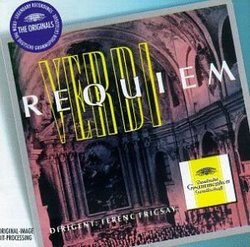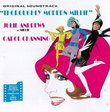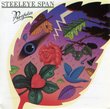| All Artists: Giuseppe Verdi, Ferenc Fricsay, Mariana Radev, Berlin RIAS-Symphonie-Orchester, RIAS Symphonie-Orchester, Maria Stader, Helmut Krebs, Kim Borg Title: Verdi: Requiem / Ferenc Fricsay Members Wishing: 0 Total Copies: 0 Label: Deutsche Grammophon Release Date: 4/9/1996 Genre: Classical Styles: Opera & Classical Vocal, Historical Periods, Early Music, Modern, 20th, & 21st Century Number of Discs: 1 SwapaCD Credits: 1 UPC: 028944744224 |
Search - Giuseppe Verdi, Ferenc Fricsay, Mariana Radev :: Verdi: Requiem / Ferenc Fricsay
 | Giuseppe Verdi, Ferenc Fricsay, Mariana Radev Verdi: Requiem / Ferenc Fricsay Genre: Classical
|
Larger Image |
CD DetailsSimilar CDs |
CD ReviewsSo Hot It May Leave Your CD Player Smoking! Timothy Dougal | Madison, Wi United States | 12/12/2001 (5 out of 5 stars) "This CD was recorded in 1954 at Jesus Christus Kirche in no-apologies, first-rate mono. The remastering is wonderful, and the modern listener needs little in the way of adjustment to the sound, which some modern engineers would do well to emulate. It is also 75 minutes long and is nicely contained on one disc. But enough of recording technique. The star of this CD is the performance, which requires words like burning, rapturous, shimmering, breathlessly urgent, and thrilling. I can hardly describe how delighted I have been with this CD over the last few years, or what a surprise it was to hear a performance of such intensity and transcendance that it wiped the two-disc digital recordings I had previously heard completely from my memory. I love Fricsay and company's reading as I have never loved Verdi before." A stunning recording of verdi's masterpiece leonardo | Argentina | 05/03/2000 (5 out of 5 stars) "The DG label has well gathered this recording together with the great recordings of the century in "The original" series. Nothing more correct than this: why? Because the musical quality still remains alive,for the terrific intensity and passion that spreads through the great climaxes of the work, besides the stylish singing (unforgetable girlish stader, secure radev,refined borg and tenor)and conducting (fast but not forced tempi), makes this recording, for me, one of the best choices. The fast tempi I have mentioned is not a detail,because it lets the work come in 1 CD (which is not common, infortunately)and proves how wrongly other conductors concieve this work and how "original" Fricsay behaves.(It is interesting that John Eliot Gardiner, one of the champions of the present "historicist" fashion -that favours fast tempi- achieves a 10 minutes longer recording). The recording dates from 1954 in Jesus Christ Church in Berlin, and you can realize how the recording respects the different acoustic layers (eg the trumpets in "Tuba Mirum"). However,the definition is not always good (is a 1954' ! )and so in the climaxes you can appreciate the passion, not the details." Exhilarating 1953 Verdi Requiem pyramidcvv | Western US | 04/12/2007 (5 out of 5 stars) "Ferenc Fricsay, the first music director of the RIAS Symphonie Orchester Berlin, is described in the liner notes as a deeply religious musician who was absolutely determined not to make this Verdi Requiem recording sound operatic. Well, I'm not sure he succeeded, at least not to this listener's ears.
The reason: the fast tempos. At 75'28", this is undoubtedly one of the fastest Verdi Requiems on record. Perhaps the conductor thought this would provide a more spiritual sound, but in fact the opposite has taken place. The breakneck speed has instead amplified the very operatic drama that Fricsay was trying to suppress, resulting in one of the most electrifying readings of the Verdi Requiem around. I was hesitant about the turbo-charged Dies Irae since I adore the choral and brass work. But to my delight, the lighting tempo really worked. The notes whizzed past my ear, of course, but I was still able to catch all the overwhelming power that Verdi intended. The only part where I thought the fast tempos didn't work was in the Agnus Dei. This has always been a point of repose for me in a work already brimming with excitement. But Fricsay's Agnus Dei just sounded too rushed and frantic for my taste. In general, I found the soloists quite satisfactory. However, I thought Helmut Krebs' "Ingemisco" sounded a bit lightweight. "Ingemisco" is a plea for divine rescue from undying hellfire. But it sounded more like an Irish ditty by John McCormack. The recorded sound is 1953 mono, but still works well. The pronunciation is literally a mixed bag: the chorus sings in Italian Latin, but the soloists use German Latin (requiem "ray-kvee-em", luceat "loo-tse-at"). This is a very, very exciting rendition of the Verdi Requiem that is sure to inspire repeated hearings. On top of that, it is available at a budget price. Liner notes include texts and translations and some interesting history behind the recording. Highly recommended." |

 Track Listings (15) - Disc #1
Track Listings (15) - Disc #1

